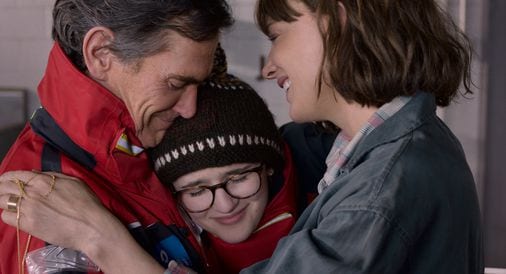Should you read the book before you watch the movie? – The Boston Globe

In the particular case of “Where’d You Go, Bernadette,” film critics who haven’t read Semple’s novel may be more negative than those who have. The movie’s not a success by any means: Too talky and exposition-heavy, and plot twists that seemed quixotically charming in the book seem fairly bizarre onscreen, including a feel-good family reunion that takes place in Antarctica. If you haven’t read the book, you’ll likely be confused, maybe even angry. Some of the early reviews have been.
Advertisement
Since I had read the book, though, I was familiar with the general warp and weft of the thing. I knew that the heroine played by Blanchett was supposed to be a supercilious pill who ultimately rediscovers her life’s purpose. Because I had the entire emotional subtext of “Where’d You Go, Bernadette” already under my belt, I felt that here was a failed film adaptation that still was earnest and touching in the right places, and certainly well-played.
Advertisement
Here’s the question, then: Is that review fair to the majority of moviegoers who haven’t
read the book? Does reading the book help or hinder a critic’s appraisal and the average moviegoer’s enjoyment? It’d be nice if there were a pat answer, but the truth is that every instance provides a different lesson.
I hardly read any of the “Harry Potter” novels, for instance. On purpose. Stopped after the first one (although my daughters kept going), because I quickly realized that too many people were obsessing over which house-elf or Quidditch match got left out of the film adaptations. Books can seem to stretch out for weeks; movies are 120 minutes, give or take — something’s gotta go. My job is to review the movie as a movie, not my memory of a book I read last year.
On the other hand, the recent wave of Young Adult bestsellers — “The Hunger Games,” for example — more readily lend themselves to cinematic translation, and they’re quick reads, so I’ll scarf them down when I can. And reading the book can help you pinpoint exactly where more ambitious movie versions go off the rails.
Case in point: the 2006 film “Everything Is Illuminated,” adapted by director Liev Schreiber from Jonathan Safran Foer’s celebrated 2002 novel. Because I’d read it, I knew that one small change wrought by the filmmakers — the changing of the ethnicity of a supporting character — completely altered the meaning of the story, subverting Foer’s message that all of us are complicit in the world’s sins into the simpler, more comforting moral that all of us are victims.
Advertisement
Because I’d read Alice Sebold’s “The Lovely Bones,” I was able to pinpoint the many, many things Peter Jackson’s 2010 film version got profoundly wrong, like his vision of the afterlife — intentionally sketchy and half-finished in the novelist’s descriptions — as a kitschy CGI Heaven. And certainly the millions of readers of Tom Wolfe’s “The Bonfire of the Vanities” understood Brian DePalma’s adaption, a legendary 1990 bomb, to be cast almost perversely against type. Tom Hanks as the callous Wall Street “master of the universe”? Bruce Willis as an Americanized version of the book’s British journalist? Didn’t DePalma understand we’d already cast the movie in our heads?
There’s the rub. Maybe if you hadn’t read the book, DePalma’s “Bonfire” would have been an acceptable film, if lacking the tart, playful authorial voice that was the reason the book existed in the first place. According to user reviews, Jackson’s “Lovely Bones” is quite well liked by any number of people who haven’t read the book. And, anyway, the best literature sticks around long after the films have been forgotten. Philip Roth’s reputation survived “Portnoy’s Complaint” (1972), “The Human Stain” (2003), and “American Pastoral” (2016).
Advertisement
And when a movie does do right by a beloved book, it can be cause for rejoicing. The better Jane Austen adaptations, for example, or at least two of the three (soon to be four) film versions of “Little Women” — the 1933 George Cukor-Katharine Hepburn and the 1994 Gillian Armstrong-Winona Ryder ones.
“Where’d You Go, Bernadette,” the novel, isn’t a classic, but it’s a pretty good read. The movie tries to be faithful in ways that hamper it as both cinema and an engaging night at the movies. Should the filmmakers not have bothered? Honestly, it may come down to what the book’s trying to do – whether it’s exploring inner states or describing outer realities. Semple was using the latter to probe the former, and that’s tricky to capture with a camera.
I just recently finished reading Toni Morrison’s “Song of Solomon,” which is a fantastic novel that (in my opinion) would never work onscreen, since all the dramatic development that’s important happens in the head and heart of the book’s young protagonist, Milkman Dead. Which didn’t stop Jonathan Demme from making a solid movie out of Morrison’s “Beloved” in 1998, if one arguably weighed down by its sense of duty toward the author. (I need to see it again; it’s been a while.)
We could play this game all day, and I invite you to play at home. What are the movies that did right by the books and the ones that did wrong? Does knowing the source improve the experience or get in the way? And please tell me if you find an answer. The film version of Donna Tartt’s epic novel “The Goldfinch” opens on Sept. 13, and I haven’t even cracked the spine yet.
Advertisement
Ty Burr can be reached at [email protected]. Follow him on Twitter @tyburr.
Let’s block ads! (Why?)

